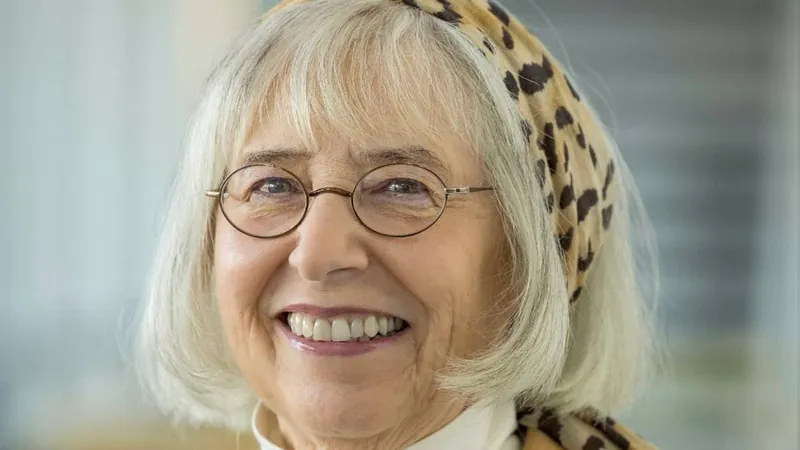
The Chilling Genetic Secret Behind Generations of Untimely Deaths in a Family
2025-01-06
Author: Ming
Introduction
Susan Weiss Liebman's life took a profound turn when she embarked on a quest to uncover the mysterious genetic mutation that has led to sudden, unexplained deaths in her family for generations. Her journey, chronicled in her compelling new book 'The Dressmaker's Mirror,' began after the shocking and tragic death of her 36-year-old niece, Karen, who was healthy and pregnant at the time.
A Family’s Tragic History
In 2008, Karen suffered a fatal collapse in a Brooklyn restaurant due to dilated cardiomyopathy (DCM), a condition that causes the heart to lose its effectiveness. This heartbreaking incident was eerily reminiscent of the health struggles faced by Karen's mother, Diane, making it clear that a genetic link was present, although it wouldn’t be discovered until years later.
A Genetic Link
Dr. Liebman reflects on this shocking realization: 'This meant that Diane’s illness was genetic and wasn’t a complication of a viral infection, as doctors formerly assumed. Instead, Diane transmitted a deadly gene to Karen.' Motivated by her family's tragic history, including her father's unexpected heart attack at the age of 66, Liebman, a seasoned geneticist, dedicated herself to solving the mystery.
Uncovering the Mutation
As she delved into the nuances of genetics, Dr. Liebman uncovered a disturbing pattern. Many familial fatalities, including those of her grandmother and other ancestors, appeared to be connected to an inherited gene mutation that compromises the function of muscle cells, particularly those in the heart. This realization was not just a clinical curiosity for Dr. Liebman; it was a deeply personal crusade to shield her family from potential future tragedies.
A Misleading Tale
An unsettling tale from her childhood, the death of her uncle Eugene in a supposed mirror accident, turned out to be misleading. In reality, Eugene had succumbed to congestive heart failure at just four years old, having inherited the same lethal gene that affected other family members. This revelation haunted Dr. Liebman for years, highlighting the family's complex relationship with health, genetic risk, and silence surrounding mortality.
Personal and Professional Crossroads
Despite her extensive qualifications from prestigious institutions like MIT and Harvard, Dr. Liebman had yet to connect her professional understanding of genetics with the personal impact it could have on her lineage. With no clear answers after numerous tests, the puzzle began to piece itself together following Diane's death from heart failure in 2016.
Breakthrough in Discovery
Advancements in genomic technology opened new avenues for familial investigation. Dr. Liebman’s work with geneticists at Northwestern University eventually led to a breakthrough: they discovered a previously unlinked gene mutation that shed light on her family’s history of DCM. As the leading cardiologist, Dr. Beth McNally, explained, this gene variant became increasingly associated with heart conditions in later studies, significantly altering the understanding of genetic risks in Ashkenazi Jews.
Founder Gene
The mutation tied to Dr. Liebman’s family was extraordinarily rare, impacting just 1 in 800 Ashkenazi Jews and absent in other ethnic groups, thereby making it a 'Founder gene.' The discovery also prompted Dr. Liebman to reach out to relatives, informing them about their potential risk and reinforcing the importance of genetic testing. While some were receptive, others initially dismissed her concerns as irrelevant, a common challenge in exposing sensitive familial truths.
Hope for the Future
Fortunately, Dr. Liebman and her children did not carry the mutation, which provided a glimmer of hope that future generations might not face the same dire fates. Importantly, the discourse about DCM also opened doors for preventative measures. With proper healthcare, including lifestyle changes and medications, the condition can often be managed effectively, preventing many sudden deaths from occurring.
Reflections on Heritage
In her reflections, Dr. Liebman sought to reconcile her findings with her family's history and their Jewish heritage, as well as the societal implications of carrying such a significant genetic burden. The work of Dr. Michael Arad at Tel Aviv University further highlighted the importance of recognizing genetic markers in communities at risk.
Legacy of Knowledge
Drawing a poignant connection between her family’s history and present knowledge, Dr. Liebman considers how past secrets about their genetic conditions affected their future. The discovery of this deadly mutation ultimately empowers her family, giving them the tools necessary for prevention and raising awareness of heart health within their community.
Conclusion
Through her tragic yet enlightening journey, Dr. Liebman exemplifies resilience and hope, transforming a legacy of loss into a clarion call for understanding the impact of genetics on our lives. Her story is not just about uncovering a painful truth; it’s also a testament to the power of knowledge and the critical importance of genetic research in saving lives for generations to come.


 Brasil (PT)
Brasil (PT)
 Canada (EN)
Canada (EN)
 Chile (ES)
Chile (ES)
 Česko (CS)
Česko (CS)
 대한민국 (KO)
대한민국 (KO)
 España (ES)
España (ES)
 France (FR)
France (FR)
 Hong Kong (EN)
Hong Kong (EN)
 Italia (IT)
Italia (IT)
 日本 (JA)
日本 (JA)
 Magyarország (HU)
Magyarország (HU)
 Norge (NO)
Norge (NO)
 Polska (PL)
Polska (PL)
 Schweiz (DE)
Schweiz (DE)
 Singapore (EN)
Singapore (EN)
 Sverige (SV)
Sverige (SV)
 Suomi (FI)
Suomi (FI)
 Türkiye (TR)
Türkiye (TR)
 الإمارات العربية المتحدة (AR)
الإمارات العربية المتحدة (AR)